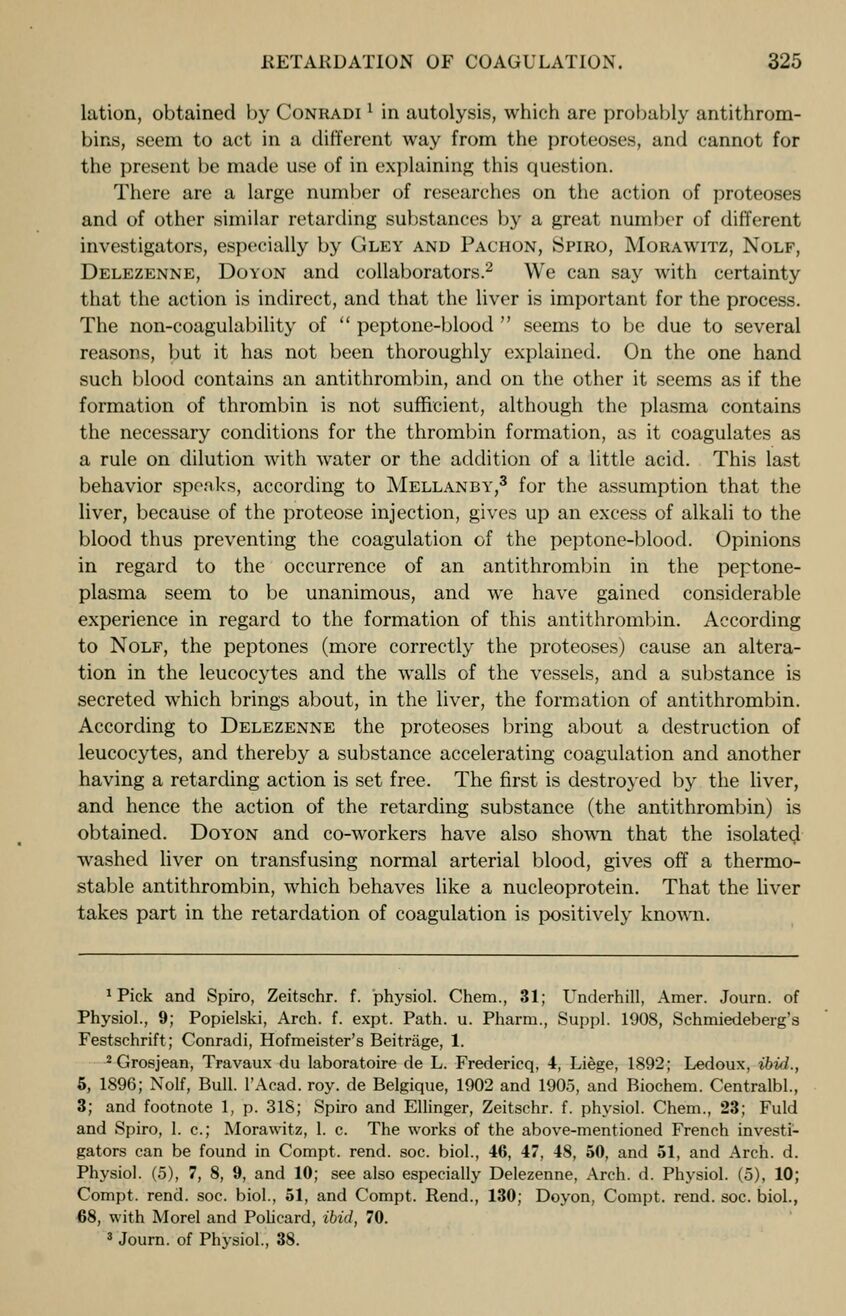
Full resolution (JPEG) - On this page / på denna sida - V. The Blood - III. The Blood as a Mixture of Plasma and Blood-corpuscles

<< prev. page << föreg. sida << >> nästa sida >> next page >>
Below is the raw OCR text
from the above scanned image.
Do you see an error? Proofread the page now!
Här nedan syns maskintolkade texten från faksimilbilden ovan.
Ser du något fel? Korrekturläs sidan nu!
This page has never been proofread. / Denna sida har aldrig korrekturlästs.
RETARDATION OF COAGULATION. 325
lation, obtained by Conradi l
in autolysis, which are probably antithrom-
bins, seem to act in a different way from the proteoses, and cannot for
the present be made use of in explaining this question.
There are a large number of researches on the action of proteoses
and of other similar retarding substances by a great number of different
investigators, especially by Gley and Pachon, Spiro, Morawitz, Nolf,
Delezenne, Doyon and collaborators.2
We can say with certainty
that the action is indirect, and that the liver is important for the process.
The non-coagulability of " peptone-blood " seems to be due to several
reasons, but it has not been thoroughly explained. On the one hand
such blood contains an antithrombin, and on the other it seems as if the
formation of thrombin is not sufficient, although the plasma contains
the necessary conditions for the thrombin formation, as it coagulates as
a rule on dilution with water or the addition of a little acid. This last
behavior speaks, according to Mellanby,3
for the assumption that the
liver, because of the proteose injection, gives up an excess of alkali to the
blood thus preventing the coagulation of the peptone-blood. Opinions
in regard to the occurrence of an antithrombin in the peptone-
plasma seem to be unanimous, and we have gained considerable
experience in regard to the formation of this antithrombin. According
to Nolf, the peptones (more correctly the proteoses) cause an altera-
tion in the leucocytes and the walls of the vessels, and a substance is
secreted which brings about, in the liver, the formation of antithrombin.
According to Delezenne the proteoses bring about a destruction of
leucocytes, and thereby a substance accelerating coagulation and another
having a retarding action is set free. The first is destroyed by the liver,
and hence the action of the retarding substance (the antithrombin) is
obtained. Doyon and co-workers have also shown that the isolated
washed liver on transfusing normal arterial blood, gives off a thermo-
stable antithrombin, which behaves like a nucleoprotein. That the liver
takes part in the retardation of coagulation is positively known.
1
Pick and Spiro, Zeitschr. f. physiol. Chem., 31; Underhill, Amer. Journ. of
Physiol., 9; Popielski, Arch. f. expt. Path. u. Pharm., Suppl. 1908, Schmiedeberg’s
Festschrift; Conradi, Hofmeister’s Beitrage, 1.
2
Grosjean, Travaux du laboratoire de L. Fredericq, 4, Liege, 1892; Ledoux, ibid.,
5, 1896; Nolf, Bull. l’Acad. roy. de Belgique, 1902 and 1905, and Biochem. Centralbl.,
3; and footnote 1, p. 318; Spiro and Ellinger, Zeitschr. f. physiol. Chem., 23; Fuld
and Spiro, 1. c; Morawitz, 1. c. The works of the above-mentioned French investi-
gators can be found in Compt. rend. soc. biol., 46, 47, 48, 50, and 51, and Arch. d.
Physiol. (5), 7, 8, 9, and 10; see also especially Delezenne, Arch. d. Physiol. (5), 10;
Compt. rend. soc. biol., 51, and Compt. Rend., 130; Doyon, Compt. rend. soc. biol.,
68, with Morel and Policard, ibid, 70.
3
Journ. of Physiol., 38.
<< prev. page << föreg. sida << >> nästa sida >> next page >>